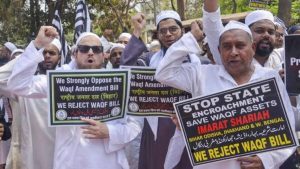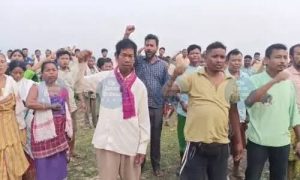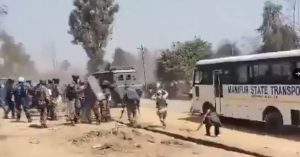The Waqf Amendment Bill has ignited a series of protests and violent incidents in Manipur, highlighting the state’s volatile socio-political landscape. The bill’s introduction has been met with resistance from various communities, leading to mass rallies and attacks on political figures’ residences.
Massive Rally in Thoubal District
In Thoubal district, a significant demonstration took place, with thousands of residents participating in a rally organized by civil society groups. The protesters voiced their opposition to the Waqf Amendment Bill, fearing it could undermine community rights and autonomy. The rally remained peaceful, with participants holding placards and chanting slogans advocating for justice and the preservation of their cultural heritage.

Arson Attacks on Political Figures’ Residences
Amid the protests, violent incidents have escalated, notably targeting the residences of political figures. The ancestral home of BJP spokesperson Michael Lamjathang Haokip in Peniel village, Churachandpur district, was set ablaze by unidentified attackers. This marked the third attack on his property within a year. Haokip condemned the violence, emphasizing the need for dialogue and non-violence to resolve conflicts.
Additionally, the residences of other legislators, including PWD Minister Govindas Konthoujam, BJP MLAs Y. Radheshyam and Paonam Brojen, and Congress MLA Th Lokeshwar, were targeted by mobs. These incidents occurred despite the imposition of curfews and increased security measures.


Government’s Response and Community Reactions
Chief Minister N. Biren Singh condemned the attacks, stating that such acts of provocation would not be tolerated and that those responsible would be held accountable. He also indicated that action would be taken against officials who failed to provide adequate security despite prior warnings.
Community leaders and civil society organizations have expressed deep concerns over the escalating violence. Former Chief Minister Okram Ibobi Singh called for urgent intervention from the Prime Minister, highlighting the failure of both state and central governments to maintain constitutional governance amid the unrest.
Broader Implications and Ongoing Tensions
The unrest in Manipur reflects broader tensions related to ethnic identities, administrative autonomy, and the management of community resources. The Waqf Amendment Bill has acted as a catalyst, bringing underlying issues to the forefront and prompting various communities to assert their rights and demand recognition.
This internal instability comes at a time when India’s northeastern region is also facing external challenges. For instance, Arunachal Pradesh has recently come under a new threat, with China allegedly planning a ‘water bomb’ strategy that could drastically affect the region’s ecological balance. Read more about the water bomb threat from China here.
The situation remains fluid, with ongoing protests and a heightened security presence across the state. The government’s ability to address the concerns of its diverse communities and navigate the complex socio-political landscape will be critical in restoring peace and stability in Manipur.


Conclusion: Navigating Community Unrest and Legislative Tensions in Manipur
The introduction of the Waqf Amendment Bill has catalyzed a wave of unrest in Manipur, uncovering deeper societal fissures that go beyond the bill itself. The state is currently witnessing an unprecedented alignment of civil protests, community mobilization, and political backlash, all centered around concerns of religious autonomy, land rights, and minority representation. What began as peaceful demonstrations against a legislative amendment has escalated into a larger movement reflecting the widespread dissatisfaction among minority groups, particularly the Muslim community, who feel increasingly alienated by state policies.
This unrest has now taken on a dual dimension—social and political. On one hand, communities are demanding the preservation of their religious and cultural institutions, while on the other, political figures and their properties have become targets of public anger, leading to destructive incidents such as arson and vandalism. These acts of violence signify a breakdown in dialogue and trust between the public and the authorities.
The government’s response so far has been criticized as inadequate, both in addressing the root cause of the protests and in managing law and order effectively. Mere condemnations of violence without tangible policy reassessment or stakeholder engagement will not be enough to pacify the situation. It is crucial that both the state and central governments recognize the urgency of the moment and initiate inclusive conversations with affected communities and civil society organizations.


As tensions continue to rise, the path forward for Manipur must involve more than just damage control—it must prioritize long-term reconciliation, protection of minority rights, and restoration of public trust in governance. Ensuring constitutional safeguards, honoring community sentiments, and fostering open communication are critical to preventing further escalation and preserving the state’s fragile harmony.

